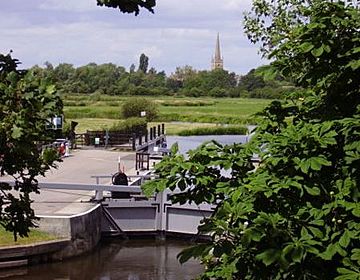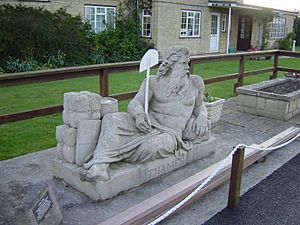St John's Lock facts for kids

St John's Lock, with Lechlade in the background
|
|
| Waterway | River Thames |
|---|---|
| County | Gloucestershire |
| Maintained by | Environment Agency |
| Operation | Manual |
| First built | 1790 |
| Latest built | 1905 |
| Length | 33.60 m (110 ft 3 in) |
| Width | 4.52 m (14 ft 10 in) |
| Fall | 0.85 m (2 ft 9 in) |
| Above sea level | 233 ft (71 m) |
| Distance to Teddington Lock |
123 miles |
St John's Lock is a special place on the River Thames in England. It is the lock furthest upstream, meaning it's the very first one you reach when traveling down the river from its source. You can find it near the town of Lechlade in Gloucestershire.
The lock gets its name from an old religious building, called a priory, which was built nearby in 1250. This priory is no longer there today. The lock itself was built from strong stone in 1790 by the group that managed the Thames, called the Thames Navigation Commission.
Just below the lock, near St John's Bridge, Lechlade, you'll find the main weir. A weir is like a small dam that controls the water level. This is also where two other rivers, the River Cole and the River Leach, join the Thames.
Outside the lock house, there is a cool statue of Old Father Thames. This statue was first made in 1854 for the grounds of The Crystal Palace. Later, it was moved to the traditional start of the Thames at Thames Head. Finally, it found its home here at St John's Lock. The famous artist Raffaelle Monti sculpted this statue, and it is now a protected historic artwork.
Contents
History of St John's Lock
Why the Lock Was Built
A lock was needed here because the Thames and Severn Canal opened in November 1789. This canal helped boats travel further upstream. The lock was built by J. Nock in 1790 to help boats move between different water levels.
Early Days and Repairs
In the early days, some boat owners tried to avoid paying the fees to use the lock. The first house for the lock-keeper was built in 1830. The lock-keeper was the person who operated the lock. By 1857, the lock was in poor condition and needed repairs. It was fixed up in 1867.
Modern Updates
In 1905, St John's Lock was rebuilt to make it better and stronger. A new house for the lock-keeper was also built on the other side of the lock. These updates helped the lock continue to work well for boats on the Thames.
Visiting St John's Lock
You can easily get to St John's Lock from St John's Bridge. This bridge is about one mile outside of Lechlade, along the A417 road. It's a great spot to see the river and the lock in action.
Exploring the River Above the Lock
Journey to Lechlade
From St John's Lock, the river winds for about three-quarters of a mile to the town of Lechlade. Here, the river passes under Halfpenny Bridge. This bridge got its name because people used to pay a "halfpenny" to cross it.
About half a mile past Lechlade, you'll find a connection to the old Thames and Severn Canal. This canal used to link the River Thames to the River Severn. It did this by connecting to other waterways like the Stroudwater Navigation and the Gloucester and Sharpness Canal. There are plans to fix up the Thames and Severn Canal. This means that one day, boats might be able to travel beyond Lechlade again!
The River Coln also joins the Thames at this canal junction. There is enough space here for a 70-foot narrowboat to turn around carefully.
Beyond Lechlade
Lechlade is usually seen as the end of the part of the Thames where boats can easily travel. However, small boats can sometimes go another three miles beyond Lechlade if the river has plenty of water. There are no more locks upstream on the River Thames after St John's Lock.
Walking the Thames Path
The Thames Path is a long walking trail that follows the River Thames.
Path Along the River
The path follows the old towpath along the southern bank of the river, past Lechlade, all the way to Inglesham. A towpath is a path where horses used to pull boats along the river. The towpath goes as far as the connection with the old Thames and Severn Canal at Inglesham, which is about one and a half miles upstream.
New Sections and Diversions
A new path, called a permissive path, continues along the riverside to Upper Inglesham. Here, the path moves away from the river for a bit. The Thames Path then crosses the river at Water Eaton House Bridge and Eysey Footbridge before reaching Cricklade.
Beyond Inglesham, there was no towpath originally. So, if there isn't another path right by the river, the Thames Path sometimes moves away from the river. This happens in places like Ewen, Ashton Keynes, Cricklade, Castle Eaton, and Upper Inglesham.


